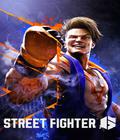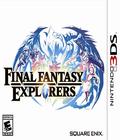Final Fantasy has origins as an RPG, but it has had a ton of spin-offs in the fighting, tactical RPG, kart racer and other genres. It's perhaps surprising that it has never really dipped its toes into the hunting genre. Games like Final Fantasy Type-0 certainly had some similarities but were not quite the same thing. Final Fantasy Explorers looks to be Square Enix's first take on the genre, and although it doesn't measure up to its competition, it's still a pretty fun game.
Unlike the rest of the franchise, Final Fantasy Explorers doesn't have much of a plot. You play as one of the titular explorers as they venture through a land filled with monsters in search of crystals. The plot generally exists to drive the hunt for more and greater beasts, so don't expect any absurd melodrama or heavy cut scenes.
On the surface, Final Fantasy Explorers is very similar to Capcom's Monster Hunter franchise. You start in a small village and take missions from a local guild keeper. These missions involve going out into the field, where you beat up monsters, take loot, and return to craft new weapons and armor to beat up bigger monsters. It's a tried and true cycle, and it's a good fit for a handheld game. Missions have time limits that can go up to an hour, but it's extremely rare for any mission to last that long, and most can be done in bite-sized, pick-up-and-play chunks. The world outside the village is divided into interconnected areas, but you quickly unlock an airship to cut out a lot of the travel time once you've explored new areas.
The gameplay is pretty standard action-RPG fare. By default, you have the ability to dash and attack, and that's about it. In true Final Fantasy style, you have various jobs you can unlock, though they're simpler than in other Final Fantasy titles. You unlock new skills for them as you play but can swap between classes, and many skills are tied to weapons rather than classes. There are distinct play styles between each. The Monk, for example, is a heavy-hitting brawler class who can chain together long combos and use evasion and counter moves to nullify damage. The Knight is more of a classic tank who can soak damage and draw aggro. Some classes just don't play well in single-player. A white mage is technically viable alone, but you're better off using a support class with other players.
Skills are interesting in that the game is very loose and light with skill usage. You can spam your abilities as much as you'd like. Rather than the franchise's traditional MP system, you've got a stamina-like AP system, which drains as you run or use skills but refills quickly with regular attacks. Several classes also have skills that rapidly replenish AP. A lot of classes don't start feeling fresh until they have a full set of skills.
Probably the most important gameplay mechanic is Resonance, which is a special stat that builds up as you or your partners attack. Once you reach at least 100 Resonance, you can activate a Crystal Drive, which is a special buff that varies somewhat randomly depending on the area. The buff can add boosts to your attack damage, add buffs, change the elements of your attacks, and a variety of other bonuses. Crystal Drives have a chance to cause ability mutations. When the stage is finished, you can spend Crystal Points to buy an upgraded version of that skill with the mutation permanently equipped. These upgraded versions of skills can further mutate, allowing you to take a weak skill and make it increasingly powerful through repeated mutations. Ultimately, your boost can boost your attack, apply Regen, grant Haste and cause you to Float.
For me, the mutation system was the most engrossing part of Final Fantasy Explorers. Weapon crafting tends to devolve into bigger numbers and never felt as satisfying. The mutation system is simple but provides a near-constant stream of progression that helps the game feel satisfying. You'll never be assured of getting a good mutation on every mission, but it happens so often that you rarely feel like you're not moving forward. It also helps that you can set up different variations on the same skill. Having one attack mutate heavy fire damage and another heavy lightning damage means you can swap them for various bosses.
Resonance is what really dictates the pace of the game. Obviously, you want to get new skills, and to get new skills, you need high resonance. However, to get high resonance, you need to keep a long chain while fighting enemies, making the pacing extremely fast despite some loose time limits. The game strongly encourages you to keep moving and keep fighting. Even when fighting bosses, you want to balance using your skills with avoiding damage and properly buffing. This is easier in co-op, where your partners can pick up the slack, and co-op tends to end up with insane resonance stacks when a team works together properly.
The other cool feature in the game is Trance, which is a mode where a character can achieve an extremely powerful new form. In Explorers, this takes two shapes. One allows you to use Magicite to transform into powerful summon beasts for a brief period of time. The other allows you to transform into iconic Final Fantasy characters like Cecil, Cloud or Lightning. Regardless of which you choose, you'll get a lot of use out of these special forms. If you activate a Crystal Surge while in these forms, you'll even gain access to their special moves, such as Cloud's Omnislash. It's a neat feature, and the only flaw is that it can make things a little repetitive after a while. Those who'd rather fight as their own character can still unlock costumes and weapons based on these characters, so you're not obligated to use Cloud if you want to use the Buster Sword.
Final Fantasy Explorers is absolutely designed around co-op. The mechanics reward a team of four people working together to beat enemies more so than they reward a single player going it alone. You can create AI monster partners who help take some of the heat off you in combat, but much of the time, they melt in boss battles. If you have the option, it's best to play with others. Fortunately, the game does support online and offline multiplayer, so it isn't difficult to work out a team.
One area where the game disappoints is in the boss battles. The bulk of major fights in Explorers is against classic Final Fantasy foes like Bahamut, Ifrit, Ramuh and others. You want to avoid their hardest-hitting attacks and hit them while they're vulnerable. Sometimes they have gimmicks, like a boss who turns the screen black until you destroy crystals. I enjoyed most of the fights, but they never reached the highs of Monster Hunter or even God Eater. Figuring out a good skill combination and taking down a strong enemy is still satisfying and enjoyable, but it lacks bite. The game lets you apply some challenges in order to get greater rewards, such as reducing the damage you deal or limiting your item usage, but they don't alter the formula much.
The entire Final Fantasy Explorers experience is pretty simplistic. Despite its obvious Monster Hunter origins, Final Fantasy Explorers doesn't really feel like a Monster Hunter game. It's more reminiscent of the old-school beat-'em-ups like River City Ransom. The trademarks of Monster Hunter are there, so you collect a lot of loot and fight a lot of monsters, but the gameplay doesn't feel similar at all. In some ways, this is a positive. It's an easy game to casually pick up and play, and it's fun to smash through enemies. It's just that the game spends so much time reminding you of Monster Hunter that its surface-deep similarities are disappointing.
Visually it's a standard 3DS game. The character models are cute but more akin to Bravely Default rather than Monster Hunter's more involved designs. The animations are simple, and the game is never too impressive to look at. Still, it runs smoothly, and all the Final Fantasy characters and monsters are easily recognizable. The soundtrack is reasonably solid but contains no real standouts beyond classic Final Fantasy tunes. It does its job reasonably well, but nothing lingers after the game is done.
Final Fantasy Explorers is a poor Monster Hunter clone but still a reasonably fun game. It's a lot of fun to team up with three friends and beat your way through Bombs, Chocobos and Tonberries, even if it ends up feeling repetitive after a while. Those who've cut their teeth on Capcom's beasts will probably find the gameplay too basic, but newcomers to the genre, especially Final Fantasy fans, should find it to be a good introduction to the basics. It's not the best hunting game on the market, but it's one of the most accessible, especially to those used to the slower pace of RPGs.
Score: 7.0/10
More articles about Final Fantasy Explorers











 Final Fantasy Explorers is a new action-role playing adventure, where players can dive into dungeons to collect crystals scattered throughout the world while battling classic Final Fantasy enemies.
Final Fantasy Explorers is a new action-role playing adventure, where players can dive into dungeons to collect crystals scattered throughout the world while battling classic Final Fantasy enemies.


















































